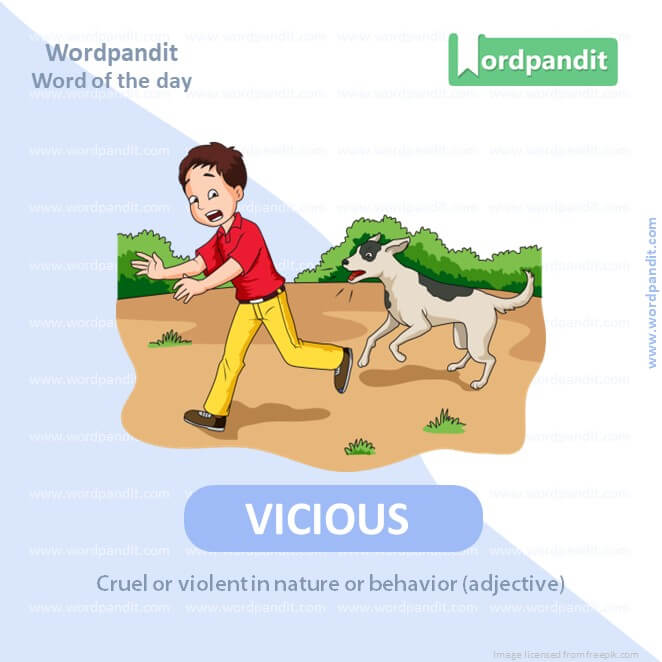Daily Vocabulary Words: List of Daily Used Words in Leading Indian Newspapers
Hi there. Welcome to this special section @ Wordpandit. Our endeavour here is straightforward: highlighting daily vocabulary words that you would come across in leading newspapers in the country. We have included the following newspapers in our selection:
• The Times of India
• The Economic Times
• Hindustan Times
• Mint
• Indian Express
We are putting in extensive work to develop your vocabulary. All you have to do is be regular with this section and check out this post daily. This is your repository of commonly used words; essentially, we are posting a list of daily used words. Hence, this has significant practical application as it teaches you words that are commonly used in leading publications mentioned above.
Visit the website daily to learn words from leading Indian newspapers.

WORD-1: VICIOUS
CONTEXT: Many of us are stuck in a vicious cycle of ‘achieving more’ to be happy, and then worrying over whether our achievements are being applauded, acknowledged and awarded.
SOURCE: The Times of India
EXPLANATORY PARAGRAPH: Imagine a dog that always wants to bite, growl, or hurt others. It’s not friendly or kind. When something acts mean or hurtful all the time, we call it “vicious”.
MEANING: Cruel or violent in nature or behavior (adjective).
PRONUNCIATION: vih-shus
SYNONYMS: Malicious, Ferocious, Savage, Brutal, Ruthless, Wicked, Malevolent
USAGE EXAMPLE:
1. The cat became vicious when anyone tried to touch its kittens.
2. The movie showed a vicious battle between two armies.
3. Tom’s vicious remarks hurt Linda’s feelings.
4. We must be careful around vicious animals.

WORD-2: APPLAUDED
CONTEXT: Many of us are stuck in a vicious cycle of ‘achieving more’ to be happy, and then worrying over whether our achievements are being applauded, acknowledged and awarded.
SOURCE: The Times of India
EXPLANATORY PARAGRAPH: When you like something a lot, you might clap your hands together to show that you enjoyed it. This action is called “applauding”.
MEANING: To show approval or praise by clapping hands (verb).
PRONUNCIATION: uh-plaw-ded
SYNONYMS: Cheered, Clapped, Praised, Acclaimed, Celebrated, Commended, Lauded
USAGE EXAMPLE:
1. The audience applauded loudly after the performance.
2. She was applauded for her bravery.
3. The students applauded the teacher’s announcement.
4. Everyone applauded the mayor’s decision.

WORD-3: IMPOSING
CONTEXT: We cannot accept that our action may not produce the desired result, worse, it could have an adverse impact also. The problem with imposing conditions on the outcome of actions is that it has a tendency to ‘seek out’ when the path of truth is to ‘seek in’.
SOURCE: The Times of India
EXPLANATORY PARAGRAPH: Imagine a big, tall, and grand castle. It looks so powerful and strong that you can’t help but notice it. We call such things “imposing”.
MEANING: Impressive and grand because of size, appearance, or manner (adjective).
PRONUNCIATION: im-poh-zin
SYNONYMS: Grand, Majestic, Stately, Commanding, Impressive, Formidable, Magnificent
USAGE EXAMPLE:
1. The imposing mansion overlooked the entire city.
2. The mountain’s imposing presence attracted many tourists.
3. She had an imposing stature that commanded respect.
4. The new statue in the park is truly imposing.

WORD-4: SATIATE
CONTEXT: We cannot accept that our action may not produce the desired result, worse, it could have an adverse impact also. The problem with imposing conditions on the outcome of actions is that it has a tendency to ‘seek out’ when the path of truth is to ‘seek in’. When we seek out, we jump from one desire to the other. In this state, we move away from intelligence by setting ourselves on course to satiate our desires, which are infinite.
SOURCE: The Times of India
EXPLANATORY PARAGRAPH: Imagine you ate so much candy that you don’t want any more because you’re completely full. That feeling of being totally full or satisfied is called “satiated”.
MEANING: To satisfy a need or desire fully (verb).
PRONUNCIATION: say-shee-ate
SYNONYMS: Satisfy, Fill, Quench, Gratify, Appease, Fulfill, Slake
USAGE EXAMPLE:
1. The large meal was enough to satiate his hunger.
2. She read books to satiate her curiosity.
3. The water was enough to satiate his thirst.
4. The concert satiated her love for music.

WORD-5: ARBITRARILY
CONTEXT: Watch any Grand Slam and all the top tennis players call for three or four identical tennis balls before each service, stare at them and then reject two most arbitrarily. Never figured out how they make this choice and what’s so special about the ones they keep but I empathise with the ones thrown away.
SOURCE: The Times of India
EXPLANATORY PARAGRAPH: Imagine picking a toy with your eyes closed, without thinking about which one you’re choosing. That’s like picking something “arbitrarily”, which means without a clear reason.
MEANING: Based on random choice rather than reason or system (adverb).
PRONUNCIATION: ahr-bi-trair-uh-lee
SYNONYMS: Randomly, Haphazardly, At random, Indiscriminately, Whimsically, Capriciously, Erratically
USAGE EXAMPLE:
1. The numbers were chosen arbitrarily.
2. They were seated arbitrarily around the table.
3. She picked a card arbitrarily from the deck.
4. Decisions made arbitrarily can have unpredictable outcomes.
WORD-6: EMPATHISE
CONTEXT: Watch any Grand Slam and all the top tennis players call for three or four identical tennis balls before each service, stare at them and then reject two most arbitrarily. Never figured out how they make this choice and what’s so special about the ones they keep but I empathise with the ones thrown away.
SOURCE: The Times of India
EXPLANATORY PARAGRAPH: Imagine if your friend feels sad because they lost their toy, and you understand how they feel because you lost a toy once too. When you feel and understand someone’s feelings, you “empathise” with them.
MEANING: To understand and share the feelings of another person (verb).
PRONUNCIATION: em-puh-thize
SYNONYMS: Sympathize, Understand, Relate, Identify, Connect, Commiserate, Feel for
USAGE EXAMPLES:
1. She could empathise with his struggles.
2. It’s important to empathise with those who are in pain.
3. I empathise with your situation.
4. Teachers should empathise with their students’ challenges.
WORD-7: SMUG
CONTEXT: That is because I feel like those discarded balls when I enter an aircraft through business class with all those smug pax sprawled in wide chairs sipping juice as I chug along to my teeny weeny seat at the back and shoehorn myself into it.
SOURCE: The Times of India
EXPLANATORY PARAGRAPH: Imagine someone who always thinks they are the best and looks very pleased with themselves, even if they are not kind. That overly pleased and self-satisfied feeling is called being “smug”.
MEANING: Having an excessive pride in oneself or one’s achievements (adjective).
PRONUNCIATION: smuhg
SYNONYMS: Self-satisfied, Complacent, Self-righteous, Conceited, Pompous, Arrogant, Haughty
USAGE EXAMPLES:
1. He had a smug expression after winning the game.
2. Her smug attitude irritated many people.
3. The businessman gave a smug smile after sealing the deal.
4. She felt smug about being the first to finish the race.
WORD-8: CHUG
CONTEXT: That is because I feel like those discarded balls when I enter an aircraft through business class with all those smug passengers sprawled in wide chairs sipping juice as I chug along to my teeny weeny seat at the back and shoehorn myself into it.
SOURCE: The Times of India
EXPLANATORY PARAGRAPH: Think of a train going down the tracks making a sound like “chug-chug-chug”. Or imagine drinking a whole glass of water really fast. Both of these actions sound or feel like “chug”.
MEANING: To make a regular, loud sound like an engine (verb); To drink something quickly (verb).
PRONUNCIATION: chuhg
SYNONYMS: Guzzle, Swig, Gulp, Down, Drink fast, Swallow, Sip quickly
USAGE EXAMPLES:
1. The old car would chug along the road slowly.
2. He chugged his coffee before leaving.
3. The train chugged through the countryside.
4. She chugged the entire bottle of water after her run.
WORD-9: SHOEHORN
CONTEXT: That is because I feel like those discarded balls when I enter an aircraft through business class with all those smug pax sprawled in wide chairs sipping juice as I chug along to my teeny-weeny seat at the back and shoehorn myself into it.
SOURCE: The Times of India
EXPLANATORY PARAGRAPH: Have you ever had a tight shoe and found it hard to put your foot inside? A “shoehorn” is a tool that helps slide your foot into the shoe easily. Also, when you force something to fit where it might not belong, it’s like using a shoehorn.
MEANING: A tool used to help put on shoes (noun); To force into a tight space or difficult position (verb).
PRONUNCIATION: shoe-horn
SYNONYMS: Insert, Squeeze, Jam, Force, Wedge, Stuff, Push
USAGE EXAMPLES:
1. She used a shoehorn to put on her new boots.
2. They tried to shoehorn the big sofa through the narrow doorway.
3. A good shoehorn can extend the life of your shoes.
4. The director tried to shoehorn a new character into the story.
WORD-10: RAMIFICATIONS
CONTEXT: The inclusion of the African Union (AU) as a permanent G20 member – an Indian initiative – has big geopolitical ramifications. Africa is potentially the next global growth hub.
SOURCE: The Times of India
EXPLANATORY PARAGRAPH: Think of a tree with many branches. Each branch leads to another smaller branch. Just like a tree, sometimes one action or decision can lead to many different results or consequences. These results are called “ramifications”.
MEANING: The possible results or consequences of an action or decision (noun).
PRONUNCIATION: ram-if-ih-KAY-shuns
SYNONYMS: Consequences, Results, Outcomes, Repercussions, Effects, Aftereffects, Implications
USAGE EXAMPLES:
1. The ramifications of his decision were felt for years.
2. We need to consider the potential ramifications before proceeding.
3. The new law had many unintended ramifications.
4. She was unaware of the ramifications of her actions.











